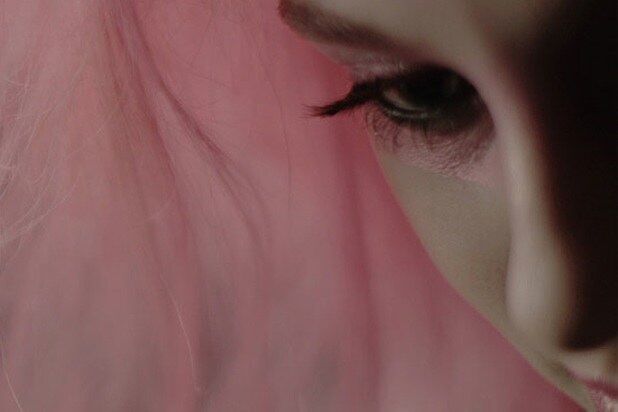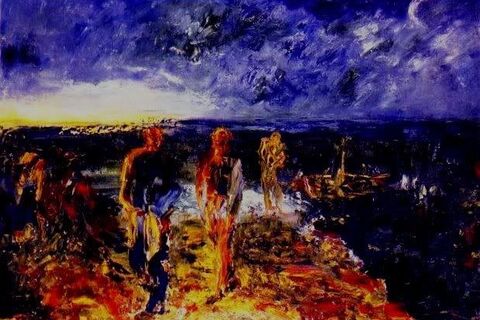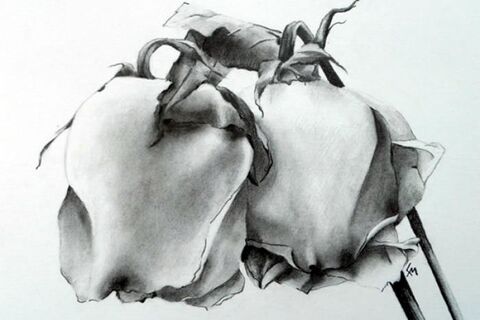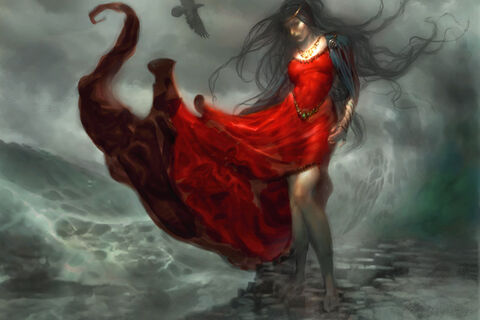The Apotheosis of Solitude

PART VI: Joy
When you create something; a poem, a painting, a song or novel: before you begin there is this wonderful moment of limitless possibility. In that moment the artwork, which is only just beginning to form in your mind, holds all the potential of a newly conceived child; myriad potential lives separating and multiplying like cells in the early development. But once you start work; once you put brush to canvas or pen to paper: the doors to those possibilities quickly, irrevocably shut. Decisions are made, lines are drawn, accidents occur and soon you realise that your talent is never going to equal to your imagination. You find that you can’t express yourself fully within the given meter and rhyme scheme; the paint won’t bathe the canvass as you hoped it might: the melody you heard in your head doesn’t sound as sweet, poignant or meaningful when played on a real instrument. The ideal form, so perfect and resplendent in the Platonic ether of your mind’s eye, refuses to translate to the real world of real sounds and real objects.
The same is true when you live inside your own head. You find, very quickly, that the real world will not correspond to the hopes you had for it. Other people have other ideas, usually quite contrary to your own, and their ideas and yours compete in the grubby agora of reality to create a bastard, deformed hybrid. Nothing ever happens as you’d envisaged.
In an odd way, I was invigorated. My experience with Selene; though it had been strange and ultimately disappointing: invigorated me. It showed me that there were other possibilities; that my life did not have to be confined to the lonely, unfulfilling sliver that I had made of it. I wanted more. For the first time, I wanted more. And, perhaps more importantly, I believed that there could be more. For longer than I could remember; my whole life really: I had thought that I was destined, condemned to live in loneliness in the lengthening shadows. My nightly walks in the city had always been a way of getting out for a few hours; had always been about being alone. But every night I saw people, couples everywhere I looked, everywhere I went I saw couples laughing and being and sharing their lives; arguing and caressing and kissing. I hated them. I hated them for their happiness and their togetherness. I hated them for the way they would grasp hands and laugh or walk home in silence, two sets of footsteps perfectly in time. I hated them because they had each other. But most of all, I hated myself. I had nothing, no-one. I looked at those couples; particularly the men in those couples: and asked myself what they had that I didn’t…what they had learned and knew that I, obviously, never had. When you are alone in a world full of couples, the loneliest place of all is in the midst of a crowd. There was something wrong; and I knew it was me. I always knew, or rather suspected, that it was me.
But something had changed. Something had changed and I didn’t want to live on the edge of the shadows anymore. Selene had loved me, I believe. The pebble and the reference to the Blake poem had indicated as much. I didn’t love her; I enjoyed her company and cherished her friendship: but I didn’t love her.
When the evenings were over, when the music had died away and she had gone home for the night and I was alone once more in my room, I would play it all over again in my mind. I would hear the music again, see the smiles and taste the chips and smell the vinegar and the perfume and hear the laughter. The conversations would become more carefully scripted, more playful and suggestive; I, for one, would become more quick-witted and erudite: but Selene’s part would be played by someone else.
Solitude.
Something had changed within me. Selene had been the catalyst. But the given circumstances; in Stanislavsky’s phrase: of my life remained the same. I needed that to change.
Solitude was playing a gig to promote her first album in an intimate venue in the city centre. There was to be a ‘meet and greet’ and signing session afterwards. Tickets were expensive, but I could live on beans and toast for a few weeks; I could not live with missing what was probably my last opportunity to talk with her face to face before something terrible and irrevocable happened (public exposure, hopeless yearning or worse!).
I would go, I would listen to her concert and afterwards I would walk right up to her, recite my fourth sonnet and then explain that I only ever wanted to reach out to her in the only way I knew how; that I was not, in any way, a stalker or some kind of weirdo: and that, if she were amenable, I would be grateful for the opportunity to buy her a drink in any well-lit public place where she felt comfortable and safe. I was going to be reasoned, reasonable and courteous. I was going to show her that she had nothing to fear from me. I was going to do what I should have done that first night in the bar, instead of just dropping my first sonnet into her pocket and leaving; or even that second night, when I ran away in despair. I was going to try to win her affections by degrees. All I wanted was the opportunity. All I ever wanted was the opportunity.
I went to the venue and took my seat some twenty minutes before the performance was scheduled to begin. I sat there, amidst the chattering excited crowd in the soft light of the auditorium. Perhaps I could have fixated on the fact that I was the only person there who didn’t seem to be part of a couple or a group of friends; that I was the only one there who seemed to be, who was, entirely alone: but I did not. Instead, I fixed my gaze on the darkened stage; no proscenium curtain to obscure the faint outline of a tall stool, the microphone and the guitar already propped up in its stand.
At ten minutes past the announced hour, the house lights slowly faded until they were gone. Darkness. The stool onstage was gradually illuminated. Then she stepped into the light. The crowd cheered, applauded and wolf-whistled; I sat still, breathing slowly, deliberately. She smiled and squinted briefly in the glare of the light. The cheering and applause continued for some moments, but I could see that she was a little uncomfortable: a little nervous and unsure. Her small, elegant hand trembled slightly as she took two attempts to grasp the neck of her guitar.
Over the sustained noise of the crowd, I could hear an offstage band trying out a few heavy rhythms on a large drum. Solitude sat on the stool, positioned the guitar on her knee and licked her lips; but the drumming from backstage was getting louder, faster, more insistent.
Then it struck me…there was no drum, no offstage band…the sound I was hearing was my own heart. I tried to calm myself; tried to breathe slowly and deeply.
Solitude began to sing. Then…everything else went away: the crowd, the quieted auditorium, the insistent beating of my heart. There was only Solitude and her song.
She sang song after song; her nervousness had evaporated: now she was at home, communicating with the world in the only way she knew how…through art. It was something I could understand; something I could relate to. I knew that if I could put it to her in just that way, she too would understand why I wrote the poems; why I could communicate with her only in that way. She would understand. I could see it in her; the same shyness, the same reticence in the face of other people that I felt myself. It was there in her manner before she sang and gone the moment she started. To everyone else in that room, she was a beautiful and talented young woman; to me, she was kindred…one and the same. I became more and more contented as the performance went on…I became happy. Then she spoke.
Her voice was soft and redolent with the cadences of hope. She said a name, Eric. The love and trust she poured into those two, simple sounds, Er-ic, seemed to hang imperceptibly in the air around her as she went on to explain that she’d met him during her brief, unsuccessful college career. They were together, then parted acrimoniously. She said that many of the songs she wrote during this period of her life were less than kind to him or his manhood. At this, many of the young women in the audience guffawed knowingly. Now…they had found each other again. They were together; they were getting married.
The room around me was silent…no, not silent, silence still has the quality of sound: there was no sound in that room now. There was nothing. Within me…numbing, stultifying heat.
Solitude introduced a new song; completed just in time to be included on the new album. It was for, and about, the baby girl now growing inside her: Eric’s daughter. The song, named in honour of the child, was called: Joy.
In the foyer, after the gig, Solitude sat at a small table to one side of the room. A line of happy, chattering, guffawing fans snaked from the foot of that table all the way across to the other side of the room; cd copies of the album and souvenir programmes in hand: all shuffling towards their few seconds of inchoate congratulations.
I stood at the door, watching.
One face is clothed in splendour, one in shade
Even before the houselights had come up in the auditorium, I’d decided that I would not queue with cd in hand, sonnet in mind, hope in heart. There was no point.
I pulled the heavy glass door open; the cold night air rushed in and blasted me in the face. I stepped out, with purpose, then faltered. I shouldn’t. I couldn’t. Why do it to myself?! I didn’t want to, but I did…I turned and stared in through the glass door for a few moments more.
Some metaphors are too apposite to resist.
End of Part VI.
Like 2 Pin it 0



Comments
Love this ink. You have such a gift for writing. it's an honor to read your work!
Feeling bad for him...Was hoping Solitude would come to love him as much as he loved her...Too bad She's in love with Eric
Indeed.
Thank you for sticking with it this far, Rose. It's not quite over yet, though.
J x